(I will put a 500 reputation bounty on this question as soon as it's eligible - unless the question got closed.)
Problem in one sentence
Reading frames from a VideoCapture advances the video much further than it's supposed to.
Explanation
I need to read and analyze frames from a 100 fps (according to cv2 and VLC media player) video between certain time-intervals. In the minimal example that follows I am trying to read all the frames for the first ten seconds of a three minute video.
I am creating a cv2.VideoCapture object from which I read frames until the desired position in milliseconds is reached. In my actual code each frame is analyzed, but that fact is irrelevant in order to showcase the error.
Checking the current frame and millisecond position of the VideoCapture after reading the frames yields correct values, so the VideoCapture thinks it is at the right position - but it is not. Saving an image of the last read frame reveals that my iteration is grossly overshooting the destination time by over two minutes.
What's even more bizarre is that if I manually set the millisecond position of the capture with VideoCapture.set to 10 seconds (the same value VideoCapture.get returns after reading the frames) and save an image, the video is at (almost) the right position!
Demo video file
In case you want to run the MCVE, you need the demo.avi video file. You can download it HERE.
MCVE
This MCVE is carefully crafted and commented. Please leave a comment under the question if anything remains unclear.
If you are using OpenCV 3 you have to replace all instances of cv2.cv.CV_ with cv2.. (The problem occurs in both versions for me.)
import cv2
# set up capture and print properties
print 'cv2 version = {}'.format(cv2.__version__)
cap = cv2.VideoCapture('demo.avi')
fps = cap.get(cv2.cv.CV_CAP_PROP_FPS)
pos_msec = cap.get(cv2.cv.CV_CAP_PROP_POS_MSEC)
pos_frames = cap.get(cv2.cv.CV_CAP_PROP_POS_FRAMES)
print ('initial attributes: fps = {}, pos_msec = {}, pos_frames = {}'
.format(fps, pos_msec, pos_frames))
# get first frame and save as picture
_, frame = cap.read()
cv2.imwrite('first_frame.png', frame)
# advance 10 seconds, that's 100*10 = 1000 frames at 100 fps
for _ in range(1000):
_, frame = cap.read()
# in the actual code, the frame is now analyzed
# save a picture of the current frame
cv2.imwrite('after_iteration.png', frame)
# print properties after iteration
pos_msec = cap.get(cv2.cv.CV_CAP_PROP_POS_MSEC)
pos_frames = cap.get(cv2.cv.CV_CAP_PROP_POS_FRAMES)
print ('attributes after iteration: pos_msec = {}, pos_frames = {}'
.format(pos_msec, pos_frames))
# assert that the capture (thinks it) is where it is supposed to be
# (assertions succeed)
assert pos_frames == 1000 + 1 # (+1: iteration started with second frame)
assert pos_msec == 10000 + 10
# manually set the capture to msec position 10010
# note that this should change absolutely nothing in theory
cap.set(cv2.cv.CV_CAP_PROP_POS_MSEC, 10010)
# print properties again to be extra sure
pos_msec = cap.get(cv2.cv.CV_CAP_PROP_POS_MSEC)
pos_frames = cap.get(cv2.cv.CV_CAP_PROP_POS_FRAMES)
print ('attributes after setting msec pos manually: pos_msec = {}, pos_frames = {}'
.format(pos_msec, pos_frames))
# save a picture of the next frame, should show the same clock as
# previously taken image - but does not
_, frame = cap.read()
cv2.imwrite('after_setting.png', frame)
MCVE output
The print statements produce the following output.
cv2 version = 2.4.9.1
initial attributes: fps = 100.0, pos_msec = 0.0, pos_frames = 0.0
attributes after reading: pos_msec = 10010.0, pos_frames = 1001.0
attributes after setting msec pos manually: pos_msec = 10010.0, pos_frames = 1001.0
As you can see, all properties have the expected values.
imwrite saves the following pictures.
You can see the problem in the second picture. The target of 9:26:15 (real time clock in picture) is missed by over two minutes. Setting the target time manually (third picture) sets the video to (almost) the correct position.
What am I doing wrong and how do I fix it?
Tried so far
cv2 2.4.9.1 @ Ubuntu 16.04
cv2 2.4.13 @ Scientific Linux 7.3 (three computers)
cv2 3.1.0 @ Scientific Linux 7.3 (three computers)
Creating the capture with
cap = cv2.VideoCapture('demo.avi', apiPreference=cv2.CAP_FFMPEG)
and
cap = cv2.VideoCapture('demo.avi', apiPreference=cv2.CAP_GSTREAMER)
in OpenCV 3 (version 2 does not seem to have the apiPreference argument).
Using cv2.CAP_GSTREAMER takes extremely long (about 2-3 minutes to run the MCVE) but both api-preferences produce the same incorrect images.
When using ffmpeg directly to read frames (credit to this tutorial) the correct output images are produced.
import numpy as np
import subprocess as sp
import pylab
# video properties
path = './demo.avi'
resolution = (593, 792)
framesize = resolution[0]*resolution[1]*3
# set up pipe
FFMPEG_BIN = "ffmpeg"
command = [FFMPEG_BIN,
'-i', path,
'-f', 'image2pipe',
'-pix_fmt', 'rgb24',
'-vcodec', 'rawvideo', '-']
pipe = sp.Popen(command, stdout = sp.PIPE, bufsize=10**8)
# read first frame and save as image
raw_image = pipe.stdout.read(framesize)
image = np.fromstring(raw_image, dtype='uint8')
image = image.reshape(resolution[0], resolution[1], 3)
pylab.imshow(image)
pylab.savefig('first_frame_ffmpeg_only.png')
pipe.stdout.flush()
# forward 1000 frames
for _ in range(1000):
raw_image = pipe.stdout.read(framesize)
pipe.stdout.flush()
# save frame 1001
image = np.fromstring(raw_image, dtype='uint8')
image = image.reshape(resolution[0], resolution[1], 3)
pylab.imshow(image)
pylab.savefig('frame_1001_ffmpeg_only.png')
pipe.terminate()
This produces the correct result! (Correct timestamp 9:26:15)
Additional information
In the comments I was asked for my cvconfig.h file. I only seem to have this file for cv2 version 3.1.0 under /opt/opencv/3.1.0/include/opencv2/cvconfig.h.
HERE is a paste of this file.
In case it helps, I was able to extract the following video information with VideoCapture.get.
brightness 0.0
contrast 0.0
convert_rgb 0.0
exposure 0.0
format 0.0
fourcc 1684633187.0
fps 100.0
frame_count 18000.0
frame_height 593.0
frame_width 792.0
gain 0.0
hue 0.0
mode 0.0
openni_baseline 0.0
openni_focal_length 0.0
openni_frame_max_depth 0.0
openni_output_mode 0.0
openni_registration 0.0
pos_avi_ratio 0.01
pos_frames 0.0
pos_msec 0.0
rectification 0.0
saturation 0.0



